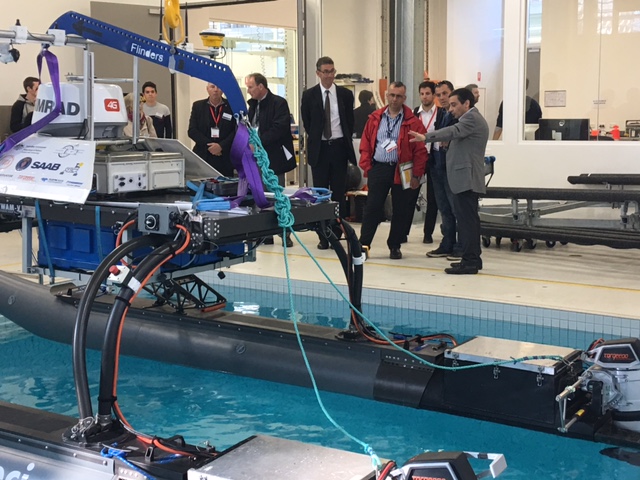
Flinders University will play key roles in two new national defence research programs – one with the first Counter Improvised Threats Grand Challenge and others under the new Defence Cooperative Research Centre (CRC) for Trusted Autonomous Systems.
More than 200 proposals were submitted for the first round of Grand Challenge funding, including one of the successful projects – $2.9 million for the ‘Detection of Chemical Hazards and Concealed Explosives’ – a collaboration between Flinders, Queensland University of Technology, and the Defence Science and Technology (DST) Group.
Under the first stage of the $50 million Defence CRC for Trusted Autonomous Systems, Flinders University will partner with Thales Australia and other collaborators in the ‘maritime domain’ program. Flinders will also support the new CRC’s ‘land domain’ research program.
Flinders University looks forward to playing a part in providing innovative solutions to support Australia’s sovereign defence capabilities, says Flinders Deputy Vice-Chancellor (Research) Professor Robert Saint.
“Our success, given the large number of Grand Challenge submissions, shows that Flinders research competes strongly on the national stage,” Professor Saint says.
“The Australian Government’s Next Gen Tech Fund, through initiatives such as the Grand Challenge and new Defence CRC, provides a vital framework for building on this high-quality research.”
The Flinders Centre for Maritime Engineering, Control, and Imaging (CMECI), based at the high-tech Tonsley Innovation District, facilitates research in diverse fields of autonomous systems, structural analysis and robotics, and control and estimation.
The Flinders maritime engineering research team was recently selected for the inaugural Fincantieri-Flinders-CETENA Maritime Innovation Challenge in a partnership between Flinders and Italian shipbuilding giant Fincantieri and its research arm CETENA.
The latest projects, announced this week by Defence Industry Minister Mr Christopher Pyne, capitalise on Flinders University’s College of Science and Engineering expertise in autonomous marine vehicles, chemical and forensic science, and other specialist research areas.
The first $19 million round of the Grand Challenge, an initiative under the Australian Government Defence Next Generation Technologies Fund, will fund 13 projects around Australia in which university researchers will work with industry and small business to find innovative solutions to “combat growing threats to our nation’s security”.
“These solutions will be delivered through a collaboration of 26 difference organisations, representing a research effort spanning the national innovation enterprise,” Minister Pyne said in a statement yesterday.
“The outcomes of the winner’s proposals will be developed over the next four years into a single, prototype threat detection and defeat system, led by Defence,” Mr Pyne said.
“This will be a game-changing capability and I look forward to its implementation in saving Aussie lives and property”
The $730 million Next Gen Tech Fund complements the Defence Innovation Hub as the two core initiatives of the new Defence Innovation System, outlined in the Government’s Defence Industry Policy Statement.
These two signature innovation research and development programs, together with the Centre for Defence Industry Capability, deliver on the Government‘s $1.6 billion commitment to grow Australia’s Defence industry and innovation sector.

